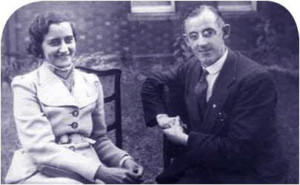
By Sarah Mac Donald - 28 April, 2017

Frank Duff and Mary Everett, Vice President of the Senatus of India in 1936.
The founder of the Legion of Mary was not impressed by the official approach to unmarried mothers and their children in the first half of the 20th century and so he founded a hostel in Dublin which was much more humane than the controversial mother and baby homes.
In a talk sponsored by the Iona Institute, Finola Kennedy, author of Frank Duff: A Life Story, explained that when Frank Duff set up his Regina Coeli hostel for homeless women in 1930, he found that many of the women arriving for help and for shelter were unmarried mothers.
He sought to help them, not stigmatise them. He helped these women keep their babies and to raise them. He was opposed to separating these mothers from their children except in rare circumstances.
Dr Kennedy highlighted how the Legion founder was critical of the country’s industrial schools, and under his leadership, the Legion of Mary rose above the attitudes of the time.
On 1 October 1930, the Regina Coeli hostel was opened by Frank Duff in North Brunswick Street in Dublin.
It was located beside the Morning Star hostel for homeless men, which Duff and his volunteer helpers had opened three years earlier in 1927. When the Regina Coeli opened, there were over 1,000 unmarried mothers with their babies in county homes.
At the time, Duff was a civil servant in the Department of Finance.
In the first week, fifteen women were admitted to the Regina Coeli. Soon after opening, an expectant mother sought admission.
Her entry into the hostel and the hostel’s support for her in keeping her baby led to the inauguration of the Mater Dei, a type of hostel within a hostel, specifically organised on the basis of units for mothers and children.
By Christmas 1930, a couple of months after the hostel’s opening, the minutes of the hostel report that residents were going to the Coombe Hospital for the delivery of their babies.
Later on, the Legion acquired some houses in North Great Georges Street, which were divided into flats and could be used by the women and their children as step-down facilities before they moved on to independent living.
The official approach to unmarried mothers and their children did not appeal to Frank Duff.
Unmarried mothers were divided into two classes: (a) first offenders, to be dealt with in the same institution as children until the children were fostered or boarded out and (b) old offenders to be sent to a Magdalen Asylum.
In a memorandum entitled ‘The Amendment of the Criminal Law’ written by Duff in 1930 in preparation for the evidence which he gave to the Criminal Law Amendment Committee (Carrigan Committee), he emphasised his concern for unmarried mothers.
He compared the harsh treatment of mothers with that of those who fathered children outside marriage.
He also pointed out how easy it was for a young unmarried woman who became pregnant to be recruited into prostitution, because she lacked any form of financial support.
He described her fate. “The girl in trouble leaves home, if not driven out by her friends.”
After a period of great stress when she is unable to work because of her pregnancy, she enters the workhouse, is confined, leaves with her baby but has no home to return to. If she finds a job as a domestic servant, “The child must be supported and she herself clad on the miserable wages of the ordinary domestic servant”.
Duff concluded “it is not a matter of wonder” that the girl ends up on the streets.
His special sympathy for unmarried mothers was at odds with the mores of the time, when the consequences of an extra-marital birth were disastrous, rendering both mother and child social outcasts.
All work undertaken ahead of the opening of the Regina Coeli hostel was done on a voluntary basis with a number of legionaries opting to live in the hostels as full-time “indoor sisters”.
These indoor sisters, like the indoor brothers, were provided with subsistence in the hostel. Every homeless woman admitted into the Regina Coeli would pay a small contribution towards her keep and a “task system” of laundry or domestic work would be avoided at all costs.
If the women could not afford the tariff, bottles or jampots, which could be redeemed for money in those days, would be accepted. The object was to create “A home-life feeling about the place”.
Duff stressed that the surroundings should be as beautiful as possible, as “The silent influence of beautiful and artistic surroundings is incalculable.”
He said that the “conduct of the women will in great measure be governed by their surroundings”. The women should be encouraged to take an interest in their appearance and one legionary suggested the introduction of several panel mirrors.
Writing to a priest on the subject of industrial schools, Duff attributed difficulties encountered by the children when they left these schools as being due to “the absence of the children’s mothers during a period of life when such is necessary to the children”.
He referred to a nun whom he considered one of the best superiors of these schools but who had confided in him that “she does not believe in the schools, but only acquiesces in them as a necessary evil”.